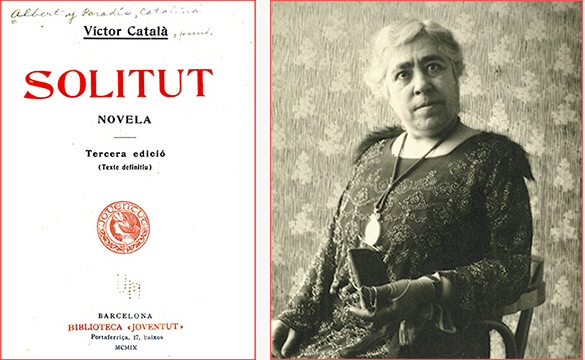14 Catalan

I don’t want you to confine my thinking to facts and agreed formulas; I do want, like birds, the liberated wings to fly at any time, now to the right, now to the left, through the space full of infinite and invisible routes; I do not want extraneous nuisances, harmful limits that impose me a path beforehand. I want to be entirely master of myself and not a slave of alien forces, insofar as human, are miserable and failing. — Víctor Català (Caterina Albert), Insubmissió (1947)
(Trans. A. B. Redondo-Campillos)
Víctor Català was a Catalan modernist literature novelist, storyteller, playwright, and poet. But Víctor Català was also Caterina Albert i Paradís (L’Escala, Girona, 1869–1966), an extraordinary talented woman writer forced to write under a male pen name. Caterina Albert decided to make herself known as Víctor Català after the publication of the monologue La infanticida (The Infanticide), for which Albert not only received the first prize in the 1898 Jocs Florals literary contest, but also an enormous backlash after the jury knew that the author was a woman. Amid the Catalan intellectual and bourgeois society of the late 19th century, Caterina Albert questions maternity as the main purpose of womanhood in the most dramatic and violent way. Víctor Català/Caterina Albert was probably the first unconscious feminist of Catalan literature.
In her magnum opus, Solitut (1905) or Solitud, first a serialized novel in the literary magazine Joventut and published later as a book, the writer follows the spiritual and life journey of Mila, a woman that moves to a remote rural environment, with a practically absent husband. In an extremely rough landscape — where the mountain becomes another character in the novel and part of Mila herself — she encounters her own sensuality, the guilt provoked by her sexual desire towards a shepherd, the unspeakable brutality of the few people living around her, and the absolute solitude. Far from being weakened because of all of these factors, Mila finds the necessary strength to get by and, finally, makes a life-changing decision.
It is 1905 and Caterina Albert depicts through Mila in Solitud the overly harsh women’s situation in a male rural society. Its novelty lies in that the writer provides the main character with the determination to overcome her disgrace. Mila transgresses the patriarchy system and takes control of her own life, and Caterina Albert transgresses the rules of a male literary society and writes whatever she wants to write. With Solitud the recognition of Víctor Català as a brilliant writer was unanimous: “the most sensational event ever seen in modern Catalan literature” in the words of critic Manuel de Montoliu (introduction to Víctor Català’s Obres Completes, Barcelona: Selecta, 1951).
Despite her success, Caterina Albert was considered a threat to the Noucentisme literary movement, due to her opposition to the group’s ideological agenda. After the publication of Solitud, Víctor Català published her second and last novel, Un film (3.000 metres) in 1926 and rather sporadically, some collections of short stories up to 1944. The author retired from the literary activity and died in her hometown, L’Escala, after having decided to spend the last 10 years of her life in bed.
Contribution by Ana-Belén Redondo-Campillos
Lecturer, Department of Spanish & Portuguese
Title in English: Solitude
Author: Víctor Català (pseudonym for Caterina Albert i Paradís), 1869-1966
Imprint: Barcelona : Biblioteca Joventut, 1909.
Edition: 3rd edition
Language: Catalan
Language Family: Indo-European, Romance
Source: HathiTrust Digital Library (University of Michigan)
URL: https://hdl.handle.net/2027/mdp.39015029495648
Select Print editions at Berkeley:
- Serialized edition published across eight issues in April 2015 in Joventut: periódich catalanista: literatura, arts, ciencias. Barcelona : [publisher not identified], 1900-1906.
- Solitud. Barcelona : Edicions 62, 1979.
- Solitud. 20th ed. Barcelona : Selecta, 1980. valoració crítica per Manuel de Montoliu.
- Solitude: A Novel. Columbia, La: Readers International, 1992. translated from the Catalan with a preface by David H. Rosenthal.

